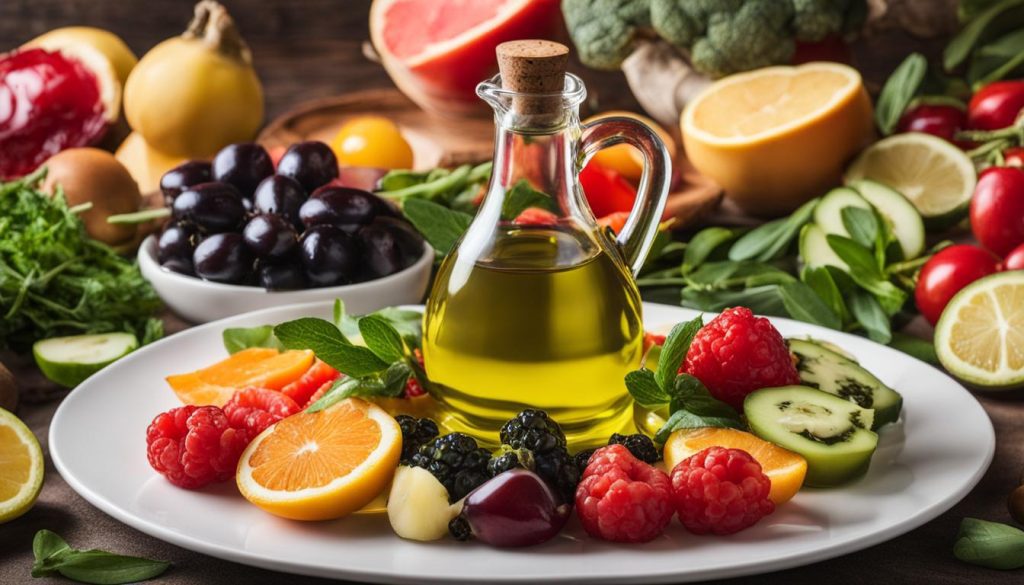Hello, I’m excited to share with you today the incredible benefits of olive oil. This versatile and delicious oil has been cherished for centuries and is renowned for its numerous health advantages. Whether you’re already a fan of olive oil or curious about its potential benefits, read on to learn why incorporating this golden elixir into your daily routine can enhance your well-being.
Benefits of Olive Oil
- Olive oil is rich in healthy monounsaturated fats.
- It contains large amounts of antioxidants.
- It has strong anti-inflammatory properties.
- Olive oil may help prevent strokes.
- It is protective against heart disease.
Olive Oil Is Rich in Healthy Monounsaturated Fats
When it comes to healthy cooking oils, olive oil is a top contender. Not only does it add flavor to your dishes, but it also offers a myriad of health benefits. One of the key reasons why olive oil is so beneficial is its high content of monounsaturated fats, particularly oleic acid.
Monounsaturated fats have been widely studied for their positive effects on health. They have been shown to reduce inflammation in the body, which is associated with various chronic diseases. In fact, a diet rich in monounsaturated fats has been linked to a lower risk of heart disease, stroke, and certain types of cancer.
Olive oil stands out among other cooking oils due to its monounsaturated fat content. In fact, about 73% of olive oil’s total oil content is made up of oleic acid, a type of monounsaturated fat. This makes olive oil an excellent choice for those looking to benefit from the health advantages of monounsaturated fats.
What makes monounsaturated fats particularly beneficial is their resistance to high heat. This means that olive oil retains its nutritional value, including its monounsaturated fats, even when used for cooking at high temperatures. Unlike some other cooking oils, olive oil does not break down and produce harmful compounds when exposed to high heat.
So, not only can you enjoy the rich flavor of olive oil in your cooking, but you can also reap the benefits of its monounsaturated fats. Whether you’re sautéing vegetables, searing meats, or drizzling it over a salad, cooking with olive oil is a smart choice for your health.
The Benefits of Cooking with Olive Oil
- Rich in monounsaturated fats, which have been associated with a lower risk of heart disease and stroke.
- Resistant to high heat, making it suitable for various cooking methods.
- Contains antioxidants that can help fight inflammation and protect against chronic diseases.
- Enhances the flavor of your dishes and adds richness to your meals.
- May aid in weight management by promoting satiety and reducing the risk of overeating.
- Provides essential nutrients, including vitamin E and K, that contribute to overall health.
By choosing olive oil for your cooking needs, you not only elevate the taste of your food but also prioritize your well-being. Incorporate this versatile oil into your culinary repertoire and enjoy the numerous benefits it has to offer.
Olive Oil Contains Large Amounts of Antioxidants
When it comes to nutrition, extra virgin olive oil stands out for its impressive antioxidant content. This high-quality oil is packed with essential nutrients that can benefit your overall health.
The antioxidants in olive oil, such as vitamins E and K, play a crucial role in reducing the risk of chronic diseases and fighting inflammation. These powerful compounds help protect the body from oxidative stress, which can lead to cell damage and various health problems.
By incorporating extra virgin olive oil into your diet, you can enjoy the powerful biological effects of antioxidants. These compounds neutralize harmful free radicals, which are unstable molecules that can cause cell damage and contribute to disease development.
In addition to their protective role, the antioxidants in olive oil also have specific benefits for heart health. They help prevent the oxidation of blood cholesterol, which can lead to the formation of plaque in the arteries. By reducing cholesterol oxidation, olive oil can help lower the risk of heart disease.
Furthermore, the antioxidants in olive oil have been found to have anti-cancer properties. They can help inhibit the growth of cancer cells and reduce the risk of certain types of cancer, including breast, colon, and prostate cancer.
Benefits of Extra Virgin Olive Oil:
- Rich in antioxidants like vitamins E and K
- Reduces the risk of chronic diseases
- Fights inflammation in the body
- Protects blood cholesterol from oxidation
- May help prevent heart disease
- Potential anti-cancer properties
Experience the amazing health benefits of extra virgin olive oil by incorporating it into your daily diet. Whether you drizzle it over salads, use it for cooking, or even consume it as a supplement, this antioxidant-rich oil can offer an array of positive effects for your well-being.

Olive Oil Has Strong Anti-Inflammatory Properties
Chronic inflammation is a leading driver of various diseases, including cancer, heart disease, and diabetes. It’s essential to combat inflammation in the body to promote overall health and well-being. Fortunately, olive oil, particularly extra-virgin olive oil, has been found to possess remarkable anti-inflammatory properties that can help in this regard.
One of the primary reasons for olive oil’s anti-inflammatory benefits lies in its rich antioxidant content. Antioxidants help neutralize harmful free radicals in the body, which can contribute to chronic inflammation. Olive oil contains polyphenols and vitamin E, both potent antioxidants that can help reduce inflammation and protect against its damaging effects.
Moreover, olive oil contains a high concentration of oleic acid, a monounsaturated fat that has been linked to anti-inflammatory effects. Studies have shown that oleic acid can inhibit the production of inflammatory substances in the body, including certain genes and proteins.
To fully grasp the power of olive oil’s anti-inflammatory properties, it’s important to understand the process of inflammation within the body. When the body senses an injury or infection, it initiates an immune response, leading to inflammation. While acute inflammation is a natural and necessary process for healing, chronic inflammation can cause significant harm.
By incorporating olive oil into your diet, you can help reduce chronic inflammation and promote better health. The anti-inflammatory effects of olive oil can provide relief for individuals suffering from conditions such as arthritis, asthma, and even inflammatory bowel disease.
Not only does olive oil help combat inflammation, but it also offers a wide range of other health benefits. From its positive effects on heart health to its potential in preventing strokes, olive oil truly is a versatile and powerful ingredient to include in your daily routine.
When selecting olive oil, be sure to opt for extra-virgin olive oil, as it retains a higher concentration of antioxidants and beneficial compounds during the production process. Incorporating olive oil into your cooking and meal preparation is an excellent way to reap its anti-inflammatory benefits while enhancing the flavor of your dishes.
Take advantage of olive oil’s strong anti-inflammatory properties and start enjoying the numerous health benefits it has to offer.
Olive Oil Help Prevent Strokes
Stroke prevention is a crucial aspect of maintaining heart health. Studies have shown that incorporating olive oil into the diet, especially extra-virgin olive oil, can lower the risk of stroke. Including olive oil in your daily meals not only adds flavor but also provides numerous health benefits.
Olive oil is unique because it is the only source of monounsaturated fat that has been linked to a reduced risk of stroke and heart disease. The high content of monounsaturated fats in olive oil helps promote heart health and overall well-being.
When choosing the best olive oil for health benefits, opt for extra-virgin olive oil as it is the least processed and retains the most antioxidants and beneficial compounds. Extra-virgin olive oil undergoes minimal processing, preserving its nutritional value and maintaining its health benefits.
Incorporating olive oil into your diet can help reduce the risk of stroke and promote heart health. Its various beneficial properties, including its content of monounsaturated fats, make it a valuable addition to a heart-healthy lifestyle.

Olive Oil Is Protective Against Heart Disease
Heart disease prevention is crucial, considering it is the leading cause of death worldwide. One of the key components of preventing heart disease is following a healthy diet. The Mediterranean diet, which includes incorporating olive oil as a primary source of fat, has been extensively studied for its beneficial effects on heart health.
Extra virgin olive oil, in particular, is known for its heart-protective properties. It offers several mechanisms that help reduce the risk of heart disease:
- Lowering inflammation: Chronic inflammation plays a significant role in the development of heart disease. The monounsaturated fats and antioxidants in olive oil have anti-inflammatory effects, thereby reducing inflammation in the body.
- Preventing oxidation of “bad” LDL cholesterol: Oxidation of LDL cholesterol increases the risk of heart disease. Olive oil’s antioxidants help protect LDL cholesterol from oxidation, keeping the arteries clear and reducing the risk of plaque buildup.
- Improving blood vessel function: The healthy fats in olive oil promote the production of nitric oxide, a compound that helps dilate blood vessels and improve blood flow, thus enhancing cardiovascular function.
- Reducing blood clotting: Olive oil contains natural compounds that help prevent excessive blood clotting, reducing the risk of heart attacks and strokes.
- Lowering blood pressure: High blood pressure is a major risk factor for heart disease. Consuming extra virgin olive oil has been found to have a modest yet significant impact on reducing blood pressure levels.
By incorporating extra virgin olive oil into your diet, you can take a proactive step in protecting your heart and reducing the risk of heart disease. Its unique combination of monounsaturated fats, antioxidants, and other beneficial compounds make it a superior choice for heart health.
Now that we’ve explored the many benefits of olive oil for heart health, let’s dive into other fascinating aspects of olive oil in the upcoming sections.
Conclusion
Throughout this article, we have delved into the incredible benefits of olive oil and its impact on various aspects of our health. From brain health to weight management, skin health to hair health, and even its culinary uses, olive oil has proven to be a true powerhouse.
When it comes to brain health, olive oil has been shown to provide nourishment and support. Its rich content of monounsaturated fats and antioxidants helps protect the brain from oxidative stress and inflammation, promoting optimal cognitive function.
If you’re looking to achieve your weight loss goals, incorporating olive oil into your diet can be highly beneficial. With its low calorie and high satiety properties, olive oil can help curb cravings and keep you feeling fuller for longer, aiding in weight management.
Not only is olive oil great for internal health, but it also works wonders for our skin and hair. Its moisturizing properties help nourish the skin and promote a youthful glow, while its hydrating effects can improve hair health and shine.
And let’s not forget its versatility in the kitchen. Cooking with olive oil not only adds a delicious flavor to your dishes but also provides the health benefits of its high content of monounsaturated fats. Its ability to withstand high heat makes it an excellent choice for sautéing, roasting, and even deep-frying.
So, whether you’re looking to boost your brain health, manage your weight, improve your skin and hair, or simply enhance your culinary creations, olive oil is a must-have in your daily routine. Choose high-quality options like extra virgin olive oil to ensure you get the maximum benefits from this incredible ingredient. Discover the wonders of olive oil and unlock a world of wellness and vitality.
FAQ
What are the benefits of olive oil?
Olive oil offers numerous health benefits due to its high content of healthy monounsaturated fats, antioxidants, and anti-inflammatory properties. Scientific research supports its positive effects on heart health, stroke prevention, weight management, and more.
Why is olive oil rich in healthy monounsaturated fats important?
Olive oil is primarily composed of monounsaturated fats, particularly oleic acid, which have been shown to reduce inflammation and have beneficial effects on genes linked to cancer. They are also resistant to high heat, making olive oil a healthy choice for cooking.
How are antioxidants beneficial in olive oil?
Olive oil, especially extra virgin olive oil, is rich in antioxidants such as vitamins E and K. These antioxidants can reduce the risk of chronic diseases, fight inflammation, and protect blood cholesterol from oxidation, lowering the risk of heart disease.
How does olive oil help with inflammation?
Chronic inflammation is a leading driver of various diseases, and olive oil has been shown to reduce inflammation in the body. The antioxidants and oleic acid in olive oil work together to inhibit genes and proteins that drive inflammation.
Can olive oil help prevent strokes?
Studies have shown that consuming olive oil, especially extra-virgin olive oil, is associated with a lower risk of stroke. Olive oil is the only source of monounsaturated fat linked to a reduced risk of stroke and heart disease.
How does olive oil protect against heart disease?
Olive oil, particularly extra virgin olive oil, protects the heart by lowering inflammation, preventing the oxidation of “bad” LDL cholesterol, improving blood vessel function, reducing blood clotting, and lowering blood pressure. Including olive oil in the diet promotes heart health.
How can olive oil be used for brain health, weight management, skin, and hair?
Olive oil offers a wide range of health benefits beyond heart health, including its positive effects on brain health, weight management, skin health, and hair health. It can be used in cooking, as a natural remedy, or as a skincare and haircare ingredient.




